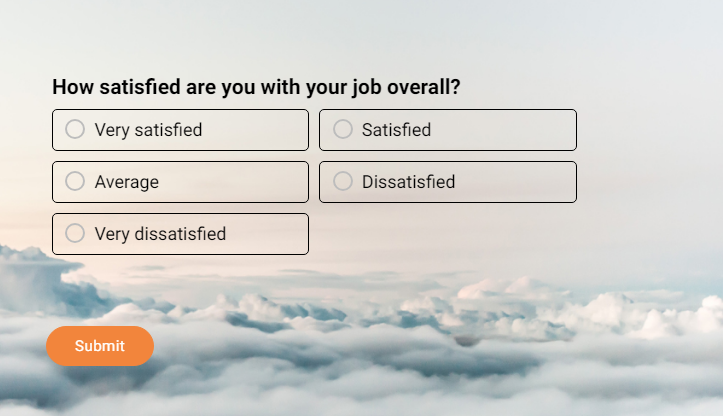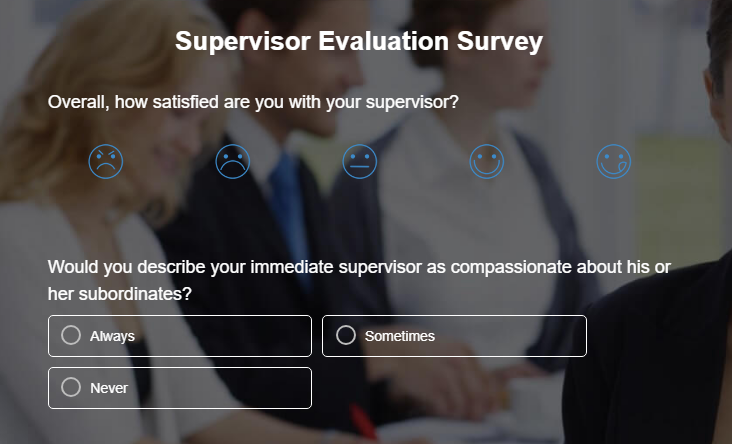
Your company culture is the invisible thread that binds your team together. In fact, a recent study by EY reveals that company culture impacts over 90% of employees’ decisions to stay with an employer.
However, quantifying an intangible metric like organizational culture is not easy. That’s why regular culture surveys are essential.
In this blog, we’ll explore why positive company culture matters, what you can learn from workplace culture surveys, and the key questions you should be asking to help your workplace thrive.
Let’s start with a quick tutorial:
Watch: 6 Quick Tips to Create Awesome Employee Engagement Surveys
What Is a Workplace Culture Survey?
A workplace culture survey is a powerful tool for organizations to understand the real employee experience versus the company’s stated values and culture. Just like employee engagement surveys, these surveys offer HR leaders valuable, real-time feedback on what it’s truly like to work at the organization.
By conducting a workplace culture survey, you can see if your workplace environment matches your values and mission. If there are gaps, these surveys will highlight them and provide a roadmap for improvement.
They help uncover the strengths and weaknesses in your culture, offering insights that can drive positive change and enhance overall employee satisfaction and retention.
10 Essential Workplace Culture Survey Questions
Understanding the intricacies of your company culture requires asking the right questions. Here are 10 key questions to gauge employee sentiments, identify areas for improvement, and foster a thriving workplace:
1. How satisfied are you with your job overall?

This question aims to capture a general sense of how employees feel about their roles and responsibilities. Job satisfaction is a critical measure of employee morale and engagement. By asking employees to rate their overall satisfaction and following up with a question to elaborate on their rating, HR can identify specific strengths and weaknesses in the employee experience.
2. Do your professional goals align with the goals of the company??

Understanding if employees see a connection between their daily tasks and the company’s broader mission is crucial. This question helps determine whether employees feel their work is meaningful and contributes to the organization’s goals. If there is a disconnect, it may indicate a need for better communication of the company’s mission or adjustments in job roles.
3. Do you feel valued and recognized for your contributions at work?

Feeling valued is fundamental to employee satisfaction. This question gauges whether employees believe their efforts are acknowledged and appreciated. If responses indicate low recognition, it suggests that the company might need to implement or improve recognition programs to boost morale and engagement.
4. How effective is communication within your team and across the organization?
Effective communication is vital for a healthy workplace culture. This question assesses the clarity, frequency, and openness of communication channels within teams and the organization as a whole. Poor communication scores may highlight the need for better information-sharing practices or training.
5. How would you describe the level of support you receive from your manager?
Managerial support is critical for employee performance and satisfaction. This question helps to understand if employees feel their managers provide the necessary guidance, resources, and encouragement. Negative feedback here can indicate a need for management training or a reassessment of leadership styles.
6. Do you feel there are opportunities for growth and development in your role?
Opportunities for professional growth are essential for retaining top talent. This question identifies whether employees see a path for career advancement and skill development within the company. If employees feel stuck, it might be time to enhance career development programs and learning opportunities.
7. How would you rate the work-life balance at our company?
Work-life balance is a significant factor in overall job satisfaction. This question measures how well employees can manage their work responsibilities alongside their personal lives. Poor ratings could suggest the need for more flexible working arrangements or better workload management.
| Looking to create an instant employee culture survey? Ask ProProfs AI Survey Generator to do it for you! |
8. How inclusive do you feel the company culture is?
Inclusion is a cornerstone of a positive work environment. This question seeks to understand if employees feel that diverse backgrounds and perspectives are welcomed and respected. If inclusivity scores are low, it may indicate a need for more diversity and inclusion initiatives.
9. How comfortable do you feel voicing your opinions and concerns?
Employee comfort in sharing feedback is crucial for continuous improvement and innovation. This question evaluates whether employees feel safe to express their thoughts without fear of negative consequences. Low scores here might suggest a need for building a more open and trusting culture.
10. Do you feel that the company’s leadership is transparent and approachable?
Leadership transparency and approachability are a must for trust and morale. This question gauges if employees believe that leadership is open about company decisions and accessible to all staff members. If feedback is negative, leaders may need to be more visible and communicative.
Take a look at our Supervisor Evaluation Survey Template:

What Are the Benefits of Conducting a Workplace Culture Survey?
Workplace culture surveys offer a wealth of insights that can significantly impact your organization. First, these surveys provide a direct line to employee experiences. By understanding their perspectives, you can identify gaps between your company’s stated values and the lived reality.
Moreover, culture surveys act as an early warning system. Anonymous feedback can surface hidden issues that might otherwise go unnoticed. Early detection can help you proactively address potential problems before they escalate to harm employee morale or productivity.
Beyond problem-solving, surveys are a tool for building a stronger, more engaged workforce. When employees feel heard and valued, they are more likely to be motivated, committed, and loyal.
Finally, the insights from culture surveys help the management to improve communication, leadership, diversity, and inclusion. By using surveys as a continuous feedback mechanism, you can foster a positive work environment that attracts and retains top talent.
How to Choose Effective Company Culture Survey Questions
Choosing the right questions for a company culture survey can unlock valuable insights and foster a positive work environment. Here’s how to select questions that provide meaningful and actionable feedback:
- Tie Questions to Specific Initiatives: Link your questions to ongoing or planned initiatives. This helps gauge their impact and relevance.
- Example: “How has the recent initiative on flexible working hours affected your work-life balance?”
- Address Both Surface and Deep Culture: Surface culture includes visible elements like dress code and office layout, while deep culture involves underlying values and beliefs.
- Example: “Do you feel the current office layout promotes collaboration effectively?” and “How well do you think our core values are reflected in everyday work?”
- Incorporate Behavioral Indicators: Ask questions that reveal actual behaviors rather than just opinions.
- Example: “In the past month, how often have you participated in team-building activities?”
- Use Scenario-Based Questions: Scenarios can provide insights into how employees might react in specific situations, revealing cultural strengths and weaknesses.
- Example: “If you had a conflict with a colleague, how comfortable would you feel addressing it directly?”
- Measure Psychological Safety: Understand how safe employees feel to express themselves without fear of negative consequences.
- Example: “How safe do you feel to speak up about issues without fear of retaliation?”
- Explore Cross-Departmental Dynamics: Gain insights into how different departments interact and collaborate.
- Example: “How would you rate the level of collaboration between your department and others?”
- Assess Adaptability: Evaluate how well the organization adapts to change and how employees feel about it.
- Example: “How supported do you feel during organizational changes or shifts in strategy?”
- Include Future-Oriented Questions: Ask employees about their aspirations and how they see the company’s future aligning with their goals.
Example: “How do you see your career growth aligning with the company’s direction in the next two years?”
FREE. All Features. FOREVER!
Try our Forever FREE account with all premium features!
How to Improve Survey Response Rates
A higher response rate means more accurate data. By making your survey engaging and valuable, you’re more likely to get the feedback you need. But that doesn’t necessarily make the task any easier!
Here are some practical tips that you can use to boost your response rate:
- Personalize it: Generic invites are boring. Add a personal touch. If possible, reference a specific interaction or project. People are more likely to respond when they feel seen.
- Incentivize smartly: Everyone loves free stuff, but it doesn’t always guarantee responses. Consider offering something related to your business or industry. For example, a tech company could offer a free software trial.
- Make it short and sweet: People are busy. Keep your survey concise and focused. If it takes longer than 5 minutes, consider splitting it into parts.
- Gamify it: Turn your survey into a game with progress bars, points, and leaderboards. A little friendly competition can go a long way.
- Offer early insights: Give respondents a taste of the results. This shows you value their input and can encourage others to participate.
Build a Highly Engaged Team With Company Culture Surveys
Creating an effective company culture survey is more than just a box-ticking exercise—it’s a vital tool for understanding and improving the workplace environment.
By asking the right questions, you can uncover hidden issues, gauge the effectiveness of your initiatives, and get a real sense of how employees feel about their work environment.
Remember to tie your questions to specific initiatives, explore both surface and deep cultural elements, and include behavioral and scenario-based questions for richer insights.
Focusing on psychological safety, cross-departmental dynamics, adaptability, and future-oriented aspirations can also provide a comprehensive view of your company’s culture.
Regularly conducting and refining your culture surveys ensures that you stay connected with your employees’ experiences and continuously work towards a better, more cohesive organizational culture.
If you are looking for inspiration or don’t know where to start, you can begin by choosing the perfect tool! Here’s a quick guide:
Watch: How to Choose the Best Survey Software
To know more, sign up for free or get a demo.
Frequently Asked Questions
1. Why is it important to improve company culture?
Improving company culture is crucial because it boosts employee engagement, satisfaction, and productivity. A positive culture attracts and retains top talent, fosters collaboration, and drives overall business success.
2. How often should you conduct organizational culture surveys?
Conduct organizational culture surveys at least annually. However, for dynamic environments or during periods of significant change, consider conducting them semi-annually or quarterly to stay updated on employee sentiments.
3. How can you use company culture survey results?
Use the results to identify strengths and areas for improvement, inform strategic decisions, develop targeted initiatives, and track progress over time. Sharing and acting on the findings shows employees that their feedback is valued.
4. What are some signs that it may be time for an organization to conduct a culture survey?
Signs include increased turnover, low employee engagement, frequent conflicts, poor communication, and resistance to change. Additionally, conducting a survey is beneficial after major organizational changes or during periods of rapid growth.
FREE. All Features. FOREVER!
Try our Forever FREE account with all premium features!

 We'd love your feedback!
We'd love your feedback!
 Thanks for your feedback!
Thanks for your feedback!







